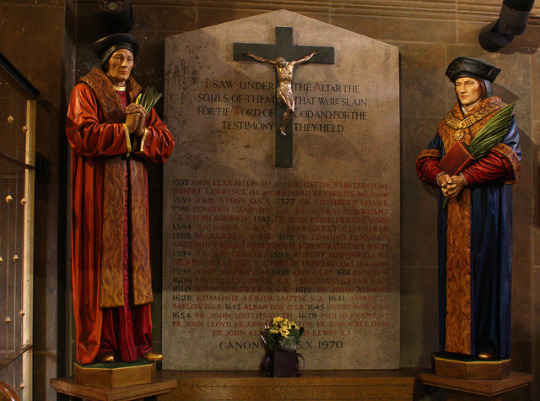
We live in a country of legal positivists. What this means is that for many of our contemporaries, the Law determines what is right or wrong. Or, indeed, what popular opinion takes to be right and good, the Law ought to permit, then encourage, and even enforce at the expense of contrary opinions. Our contemporary secular landscape is such that the State adjudicates on the rightness or wrongness of our moral actions, determines what constitutes our happiness, and many seem to think that our fundamental human dissatisfactions and dis-ease can be, under the right conditions, ultimately solved by politics. In doing so, politics, the State and her Laws presume to take the place of Christ.
As the Lord prophesied in today’s Gospel: “Many will come using my name and saying, “I am the Christ,” and they will deceive many.” This is not a recent phenomenon. The 16th-century was such a time, and although it was not the start of such an usurpation of Christ, it was a start since Henry VIII arrogated substantial powers and wealth and theological support for the Crown.
Many stood up against this, and many stood for Christ against the State, and they were felled for it – martyred for Faith in Jesus Christ and for clinging to the Truth he taught – Truth handed on faithfully from generation to generation by Christ’s holy Church. But of the hundreds who were martyred for the Catholic Faith from 1535 onwards, two are especially eminent, and they were the first to be canonised by Pope Pius XI in 1935. St John Fisher was the saintly Bishop of Rochester, Chancellor of Cambridge University, Tutor to Henry VIII, Confessor to Lady Margaret, mother of Henry VII. Erasmus considered him to be “incomparable for uprightness of life, for learning and for greatness of soul.” In short, he was an luminary of the Church. St Thomas More was a luminary of the State. He was Lord High Chancellor of England, a noted Humanist philosopher and lawyer, and a Scholar.
The combination of these two Saints reminds us that neither spiritual nor temporal lords could stand against the State and the will of the Crown. Nevertheless, both men remained steadfast in upholding the Truth of the Gospel, particularly concerning the indissolubility of Christian marriage. For their fidelity to Christ’s Word, they were executed in 1535, St John Fisher on this day (22 June), and St Thomas More on 6 July.
In our own time, the teaching of Christ on the permanence of Christian marriage, and thus the refusal to accept divorce, is largely seen as irrelevant or outdated. And, it appears, that some, even within the Catholic Church, regard this stance to be “rigid” and lacking in “mercy”. And yet, today’s Saints clung to the perennial teaching of Christ, and they were willing to die for this Truth. They died not simply as ‘conscientious objectors’ but, more fundamentally, as witnesses to the Truth of the Gospel. Truth is everlasting and it is not changed to suit us, but rather, we must conform to the Truth, above all, to the Person of Jesus Christ and to his teachings. Today’s Martyrs taught this with their lives.
As such, these great English Martyrs interrogate us: Does the Gospel Truth matter to us? Are we willing to die for the Truth? Do we even know the Truth that Christ’s Church proclaims? For happiness and right moral activity is not determined by the Law but something far more enduring and reliable: Truth. Indeed, what is right and wrong, and what will truly satisfy us as human beings is grounded in God who is Truth. It is Jesus Christ who saves us and gives us true joy and peace.
Therefore, as we honour Saints John Fisher and Thomas More today, let us ask them to pray for England and the Church in this land. And let us honour them by desiring to know, to uphold, and defend the Truth that comes from Christ. For as the Lord said: “I am the Way, the Truth, and the Life. No one comes to the Father except through me” (Jn 14:6). That is to say, our salvation comes from Christ, and not from the State, nor politics, nor the Law, nor anything that Man can manufacture. Salvation comes from a living faith in Jesus, and from a genuine relationship of humble trust in the Blessed Trinity. So, we turn now to the Altar as it is the Eucharist that draws us more deeply into God.
No comments:
Post a Comment